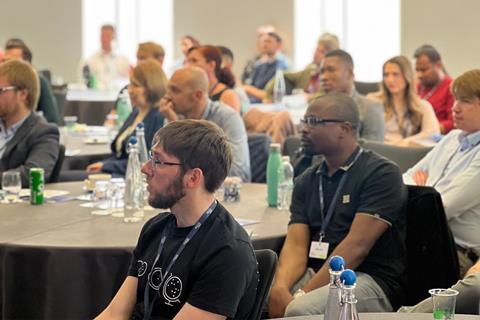Applied Microbiology International has announced the keynote speakers at the Letters in Applied Microbiology Early Career Scientist Research Symposium.

The hotly anticipated symposium, now in its 13th year, will be hosted at the University of the West of England (UWE) in Bristol, UK, on 15 May 2024.
This event offers a unique platform for emerging microbiologists to present their research, connect with colleagues, and gain insights from experienced professionals in the field.
Career in microbiology
Dr Alexander Rickard, an Associate Professor who studies biofilms at the University of Michigan, USA, will give a talk on ’A Microbiologist’s Career: From The UK to The USA and the Research Adventure Along the Way’.
Dr Richard was born and raised in Devon and is an alumnus of the University of Birmingham (BSc and MSc) and the University of Manchester (PhD) in the UK.
Following his first postdoc at the University of Manchester, he travelled to the USA to work at the National Institutes of Health just outside of Washington, DC, and subsequently worked as an Assistant Professor at Binghamton University (New York, USA) before moving on to the University of Michigan.
Girl bossing
Dr Órla Meadhbh Murray, a Lecturer in Sociology and Fellow at the Institute for Medical Humanities at Durham University, will give a talk entitled ’Girl Bossing Imposter Syndrome?’
Her research focuses on inequalities in higher education, queer feminist sociology, and Institutional Ethnography. She is the co-founder of the UK and Ireland Institutional Ethnography Network and has a forthcoming monograph in 2024 - ’University Audit Culture and Feminist Praxis: An Institutional Ethnography’. Their current research has two strands: queer feminist approaches to gut health and mental health; and imposter syndrome as a form of emotional work.
Synthetic yeast genome
Meanwhile, Dr Ben Blount will talk about ’Building and exploiting a synthetic yeast genome’. An Assistant Professor in Synthetic Genomics at Nottingham Engineering Biology Labs, University of Nottingham, he researches the application of synthetic genome strains and techniques, both for sustainable biotechnology and to test how genome content and structure determines the behaviour of cells.
Areas of particular interest include the use of the SCRaMbLE recombination system that has been engineered into synthetic yeast genome strains to generate highly genomically diverse populations of cells. These populations can be sampled through selection and screening processes for enrichment of properties of interest for biotechnological applications. This includes improved use of waste carbon sources, improved production of high value chemicals, and improved tolerance to inhibitory conditions encountered in bioreactors.
His research also focuses on the construction of synthetic yeast chromosomes housing essential genes and subsequent reduction of non-essential genes. By determining how readily genes are lost under various growth conditions, the importance of each gene to cell fitness under those conditions can be probed. This information could lead to the design of streamlined genomes suited to particular tasks.
Opportunity to engage
Whether it’s your first time attending a scientific conference or you’re looking to deepen your knowledge and connections, this is an ideal opportunity to engage with the applied microbiology community.
As well as for seasoned attendees, this event is the ideal opportunity for undergraduates, postgraduates and PhD students attending their first external scientific conference. Delegates can engage in a day filled with innovative research presentations, interactive workshops, and valuable networking. Sessions cover a wide range of topics, from antimicrobial resistance to environmental sustainability, and offer insights into the latest advancements in applied microbiology.
Chance to network
This event offers a key opportunity to network, with a schedule including a two-hour networking slot that includes poster presentations, sessions from our policy, and publishing teams, a meet the editor session and the opportunity to form connections among early career scientists, as well as with experienced researchers.
We encourage delegates to connect with fellow attendees and the wider microbiology community by actively participating in discussions on social media. Use #LAM_ECS2024 to share your experiences, insights, and continue to engage before, during, and after the event.
To increase accessibility, we offer the AMI Student Travel Bursary, which provides limited, but valuable financial support for those who face economic barriers to attending. We do encourage exploring initial funding through supervisors or departments first, as this helps prioritise the bursary for those in greatest need.
To find out more, visit the event page.







No comments yet